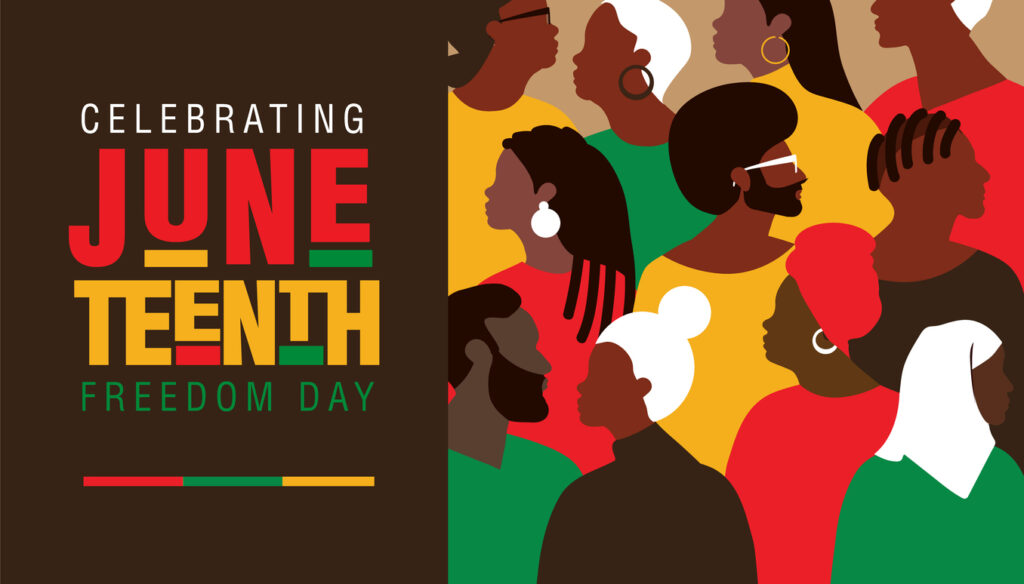
By Pascale Edouard, Zunera Mirza, and Robyn Taylor
Juneteenth commemorates the date when the last enslaved African Americans in the U.S. were informed of their freedom on June 19, 1865, despite the Emancipation Proclamation having formally freed them over two years prior . The day gained renewed significance after it was signed into legislation in 2021, designating it as a federal holiday, following the 2020 nationwide demonstrations against the brutal killings of Black Americans like George Floyd and Breonna Taylor by police.
The origins of Juneteenth trace back to June 19, 1865, when Union General Gordon Granger arrived in Galveston, Texas, to announce that the Civil War had ended and Black enslaved people were free, enforcing the Emancipation Proclamation issued by President Abraham Lincoln from January 1, 1863.
Early Juneteenth celebrations involved prayer and family gatherings, with many formerly enslaved people and their descendants making annual pilgrimages to Galveston. In 1872, Houston’s Black ministers and business leaders purchased 10 acres of land to establish Emancipation Park, dedicated to the city’s annual Juneteenth festivities. Today, celebrations range from family barbecues to huge public events in cities like Atlanta and Washington, featuring parades, festivals, and community activities.
The resurgence of Juneteenth’s prominence is deeply intertwined with the broader movement for racial justice, especially considering the murders of George Floyd, Breonna Taylor, Ahmaud Arbery, David McAtee, and others, which ignited nationwide protests and a renewed call for equality. These events reignited the Black Lives Matter movement and spurred legislative efforts to address police misconduct and racial discrimination.
Juneteenth serves as a poignant reminder of the ongoing struggle against the remnants of slavery and systemic racism. It underscores the importance of pursuing reparative justice to address the enduring impacts of slavery and white supremacy. As Dr. W.E.B. Du Bois noted in “Black Reconstruction” (1935), the journey toward true freedom and equality for Black people has been fraught with setbacks and continued oppression.
As the nation continues to face the challenges of systemic racism, Juneteenth offers an opportunity to recommit to the global fight against dehumanizing systems of oppression. Achieving the promise of freedom for future generations will require collective action and a steadfast dedication to ending the moral travesty of slavery and its enduring legacy.
Moreover, Juneteenth coincides with Men’s Health Month, drawing attention to the disproportionate burden of chronic diseases among Black men. Black men face higher rates of hypertension, diabetes, and heart disease, conditions often exacerbated by systemic inequities in healthcare access and socioeconomic disparities rooted in historical injustices. Addressing these health disparities is crucial, as it aligns with the broader goals of Juneteenth: achieving true freedom, justice, and well-being for all Americans.
NACDD’s Commitment
The National Association of Chronic Disease Directors (NACDD) is dedicated to honoring the spirit of Juneteenth by addressing health disparities through our chronic disease prevention and health promotion efforts. We recognize that achieving health equity is integral to the broader goals of social justice and liberation.
Who We Help: We are committed to improving the health and well-being of all individuals, especially those in underserved and under-resourced communities disproportionately affected by chronic diseases.
Leveraging Our Power: NACDD leverages its influence through advocacy, policy shaping, and collaboration with diverse stakeholders to address social determinants of health and promote equitable healthcare access. We provide resources, training, and support to empower communities in their efforts to prevent and manage chronic diseases.
Engaging in the Work: Inspired by the principles in “The Purpose of Power,” NACDD members can engage in this vital work by:
- Advocating for Policy Change: Supporting policies that address health inequities and remove systemic barriers to care.
- Fostering Community Partnerships: Collaborating with community organizations to develop culturally relevant and effective health interventions.
- Promoting Education and Awareness: Educating the public and healthcare professionals about the impact of systemic racism on health and the importance of equitable healthcare practices.
By recognizing and tackling health disparities, we honor Juneteenth’s legacy and move closer to a more just and equitable society. Together, we can work towards a future where everyone can achieve optimal health and well-being, free from systemic inequities.
